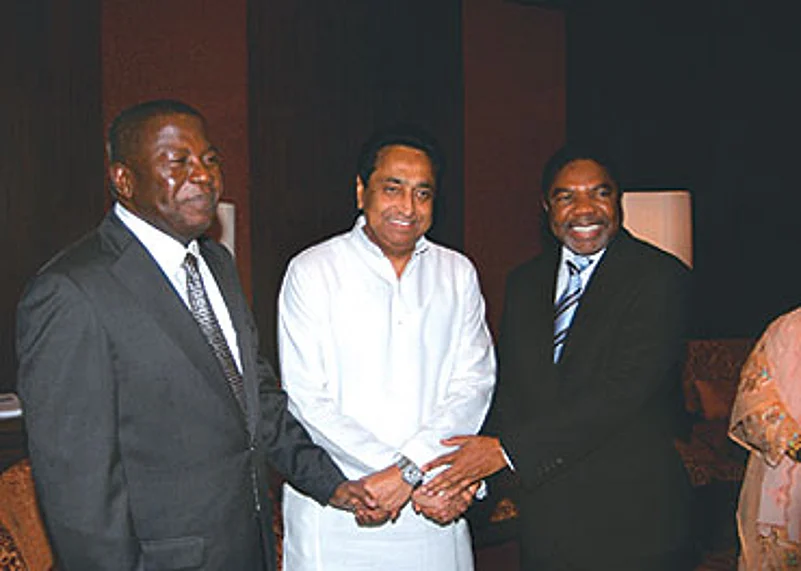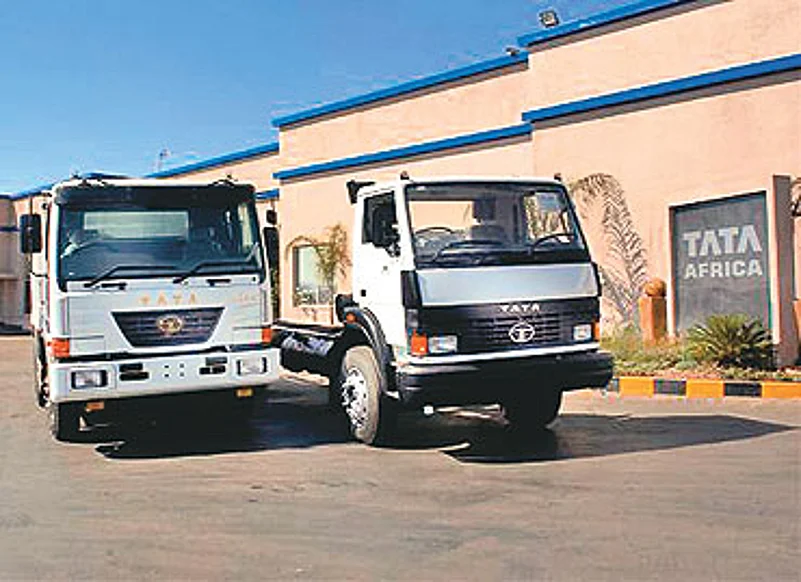
India too is at Africa's door knocking, seeking, but also sharing its knowledge. When African leaders of 14 countries and economic groupings (see infographic) along with the chairman of the African Union arrive in New Delhi for the first India-Africa Partnership Summit on April 8-9, they will be presented a model of friendship of equals. An action plan for development and a political declaration on global issues of trade, climate change and UN reforms are expected. It will be markedly different from the Chinese template of 'money for minerals'.
Rich in both resources and votes in the UN General Assembly, Africa is immensely important for India. Politics and commerce converge in a big foreign policy test for New Delhi and the hope is for wiser, cleaner and sharper responses. Many African countries are growing at more than 5 per cent with the oil-rich ones registering even double digit growth. Indian companies are eyeing Africa for profits while the government is vying for influence. The task for India is to get the right policy mix.
India-Africa trade touched $25 billion last year with many African nations running a surplus. "Self-interest is not the driver for India because we have had a partnership from the beginning. India supported the anti-apartheid struggle, it devised the technical training programme for Africa and was the first to send troops to the Congo," a senior official says. There are more than 15,000 African students studying in India. "Did we get anything in return?"
Some say that is exactly the point. India must get returns.
By contrast, China has a strikingly aggressive approach, targeting resource-rich countries like Sudan (investment $15 billion), Angola ($4 billion) and Congo ($12 billion) with aid and easy loans in exchange for access to oil, copper and manganese. Top Chinese leadership blanketed Africa with visits, ending with a summit of 35 heads of state in Beijing in 2006. It is said the first foreign trip by a Chinese foreign minister every year is always to an African country. But Indian prime ministers and presidents have found little time on their calendars for Africa. While China has 22 beefed-up embassies in western and central Africa, India has six small missions in the same region. Short-sighted belt-tightening led to India shutting down missions in Guinea, Malawi and Burkina Faso. India has a total of 24 missions for 54 countries and plans to open two more.
Here in South Africa's industrial capital of Johannesburg, Essop Pahad, one of the most powerful cabinet ministers, says that while the Delhi summit is a "very important step", he wants to engage both India and China. "Let the best man win," he says flatly. If anyone in Delhi thought India's support for the anti-apartheid struggle would earn extra credit, forget it. Pahad wants to bring Indian teachers to rural schools, asserting that his salaries will be more than what Indian teachers will get after the recent hike. Some might call this 'attitude' but hey, if China, Europe, US, Japan, Turkey and Iran are standing in line for attention, who wouldn't fly?
So, can India mark its presence in Africa against all the competition? "India has a unique and special relationship with Africa which is time-tested and rooted in history. It would not be correct to see it as a competition with any other country," Anand Sharma, minister of state for external affairs, asserted in an interview. Indian officials also find comparisons with China bothersome. "We cannot match China dollar for dollar nor do we have the command economy where state-owned companies can be ordered to pursue the government's directive regardless of their own bottom-line," wrote Navdeep Suri, India's consul general in Johannesburg, in a paper on India's Africa policy. Besides, China has begun to spark negative feelings with African trade unions protesting against the Chinese. China even became an election issue in Zambia.
Indian officials say they want to leave footprints, not pugmarks. Theirs is a more humane, pro-South strategy which baffles the west and irritates the eastern players who don't have the advantage of language or diaspora links. At the summit in Delhi, India will announce duty-free imports from the poorest African countries and an action plan covering defence training, mining, energy and cultural links. India has already given $2 billion worth of grants and lines of credit to African countries over the past five years for projects as varied as rural electrification (Mozambique, Ethiopia), IT training centre (Lesotho), railways (Senegal, Mali), construction of the National Assembly complex (Ghana), cement factory (Congo) and military barracks (Sierra Leone).
The buzzword is South-South cooperation. African leaders see the advantages of the Indian suitor who does not shower them with billions but who helps them help themselves. In fact, they want India to speed up its act. Zambia's minister of trade and industry, Felix Mutati, said as much at last month's business conclave in Delhi attended by 35 African ministers and more than 500 business delegates. "For a long-term partnership, both regions need to make a right assessment of common challenges. We are asking you if you can act faster," Mutati urged.
Ethiopia's deputy trade minister Tadessse Haile said India should be "a shareholder, not just a stakeholder" in Africa's development. African leaders know they can't resist the price China is willing to pay for their resources but in return they often get handed down railways they can't operate on their own because no locals have been trained, and crowding out of their already low-cost goods with even cheaper products. China's millions often find their way to personal bank accounts, undermining Africa's painstaking efforts in recent years to evolve a more accountable leadership. They prefer the Indian model of cooperation, which brings more appropriate technologies and managerial skills for African conditions.
Especially popular with African countries is the Indian Technical and Economic Cooperation (ITEC) programme under which more than 1,000 people from sub-Saharan Africa have been receiving training annually since 1964. India's ambassador to the African Union and Ethiopia, Gurjit Singh, says "India and Africa were changing almost at the same time at the end of the Cold War" which prompted a new systemic response from India. One of the biggest Indian government projects to emerge was the proposal for the Pan-African e-Network which would link five regional universities, five speciality hospitals, 53 regular hospitals and 53 educational institutions across Africa to Indian universities and hospitals via satellite and fibre-optic network. Proposed by former president A.P.J. Abdul Kalam, India has offered $100 million for the project for which 29 countries have already signed up.
Officials are also strengthening cultural and academic links between India and Africa. Last year's Shared Histories festival which for the first time aimed at a mainstream African audience rather than just the Indian diaspora—always the easier method—was a hit. The first Centre for Indian Studies will open this September at the University of Witwatersrand or Wits in Johannesburg, arguably Africa's premier educational institution (having produced four Nobel laureates), increasing intellectual engagement. The seed money of $400,000 is being raised by Wits with support from the Indian government. Loyiso G. Nongxa, the vice-chancellor, told Outlook he was inspired by the commitment to academic excellence in India and felt it was time to make India a "thrust area for research". Nongxa gave credit to Suri, the consul general, for bringing the project to fruition.
"It is time to change the mindset that premier research happens only in the West," says Stephen Gelb, a professor involved in the project. It is a two-way street with Indian academics showing great interest in improving their African studies departments with the help of Wits. Efforts are also under way to institute a chair in the University of Kwazulu-Natal. Interestingly enough, there is an India-China dynamic even in academics in Africa. A Centre for Chinese Studies opened at South Africa's Stellenbosch University in 2005 and Beijing is constructing a Confucius Institute in the North. Clearly, China has the same idea—influence through centres and friendship societies, something it vigorously pursued in the US to great benefit. Given that Beijing is always faster on the draw, New Delhi must think two steps ahead, analysts say.

The Tatas have marked their presence in Africa with an investment of $1.6 billion
While there is space and scope for both India and China to compete, Brand India has traction in Africa because of the low-cost, adaptable technologies—imagine a water filter for Rs 15 for the hinterlands of Senegal or chlorine tablets or affordable hiv drugs from Cipla, a true revolutionary in the field. Indian private investment in Africa is already at $5 billion, led by the Tatas who have both respect and recognition. "We have put our money where our mouth is and taken risks," said A.S. Rangan, head of Tata Motors in South Africa. From hotels to buses to telecom to hydro power plants, Tata companies have marked their presence in 14 countries with investments topping $1.6 billion. In Uganda, the word for bus in the local language is simply Tata.
Other players include Vijay Mallya's UB Group, Mahindra and Mahindra, Kirloskar, Cipla and Dr Reddy's. Tanzania is getting ready to sign an agreement with Apollo Hospital to build a facility in Dar-es-Salaam. Botswana wants India to help add value to its diamonds by cutting and polishing them there rather than sending them to Surat or Antwerp.
India may have better historical and people's links with Africa but China wields more influence. Why? It's because China delivers before it announces a project while India announces and often doesn't deliver for years. In November 2002, former prime minister A.B. Vajpayee declared $500 million in lines of credit for Africa but months later nothing had moved, leaving many African ambassadors in Delhi disappointed. The bureaucratic logjam was finally broken but disbursement is still far from complete. "We have to work on every possible opportunity, pursue it, cash it and create new opportunities," said India's high commissioner to South Africa, Rajiv Bhatia.
India must not lose sight of Africa again. Minister Sharma, who has taken a keen interest in Africa, promises: "One does not forget old friends."


























